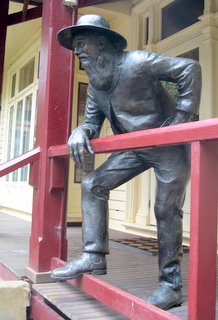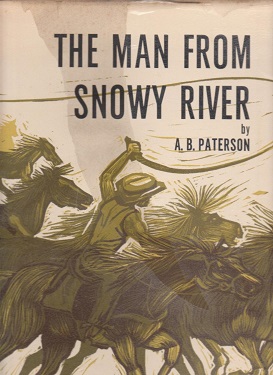
Andrew Barton "Banjo" Paterson, was an Australian bush poet, journalist and author, widely considered one of the greatest writers of Australia's colonial period.
"Clancy of the Overflow" is a famous Australian poem written by Banjo Paterson and first published in The Bulletin, an Australian news magazine, on 21 December 1889. The poem is typical of Paterson, offering a romantic view of rural life, and is one of his best-known works.

"The Man From Ironbark" is a poem by Australian bush poet Banjo Paterson. It is written in the iambic heptameter.

The "Bulletin Debate" was a well-publicised dispute in The Bulletin magazine between two of Australia's best known writers and poets, Henry Lawson and Banjo Paterson. The debate took place via a series of poems about the merits of living in the Australian "bush", published from 1892 to 1893.
"Up The Country" is a popular poem by iconic Australian writer and poet Henry Lawson. It was first published in The Bulletin magazine on 9 July 1892, under the title "Borderland." Its publication marked the start of the Bulletin Debate, a series of poems by both Lawson and Andrew Barton "Banjo" Paterson asserting contrasting views of the true nature of life in the Australian bush.
In Defence of the Bush is a popular poem by Australian writer and poet Andrew Barton "Banjo" Paterson. It was first published in The Bulletin magazine on 23 July 1892 in reply to fellow poet Henry Lawson's poem, Up The Country. Paterson's rebuttal sparked the Bulletin Debate, a series of poems by both Lawson and Paterson about the true nature of life in the Australian bush.
The City Bushman is a poem by iconic Australian writer and poet Henry Lawson. It was first published in The Bulletin magazine on 6 August 1892, under the title In Answer to "Banjo", and Otherwise. It was the fourth work in the Bulletin Debate, a series of poems by both Lawson and Andrew Barton "Banjo" Paterson, and others, about the true nature of life in the Australian bush.
Banjo, of the Overflow is a poem by Australian poet Francis Kenna. It was first published in The Bulletin magazine on 27 August 1892 in reply to fellow poets Henry Lawson, Banjo Paterson and Edward Dyson. This poem formed part of the Bulletin Debate, a series of works by Lawson, Paterson, and others, about the true nature of life in the Australian bush.
This article presents a list of the historical events and publications of Australian literature in 1892.
The Poets of the Tomb is a poem by Australian writer and poet Henry Lawson. It was first published in The Bulletin magazine on 8 October 1892 in reply to fellow poet Andrew Barton "Banjo" Paterson's poem, In Answer to Various Bards.
A Voice from the Town is a poem by Australian writer and poet Andrew Barton "Banjo" Paterson. It was first published in The Bulletin magazine on 20 October 1894.
Saltbush Bill is a humorous poem by Australian writer and poet Andrew Barton "Banjo" Paterson. It was first published in The Bulletin magazine on 15 December 1894, the Christmas issue of that publication.
Saltbush Bill's Gamecock is a humorous poem by Australian writer and poet Andrew Barton "Banjo" Paterson. It was first published in Brooks's Australian Xmas Annual Volume 1 1898.

Saltbush Bill's Second Fight is a humorous poem by Australian writer and poet Andrew Barton "Banjo" Paterson. It was first published in The Antipodean in 1897.
Saltbush Bill on the Patriarchs is a humorous poem by Australian writer and poet Andrew Barton "Banjo" Paterson. It was first published in The Evening News on 19 December 1903.
Saltbush Bill, J.P. is a humorous poem by Australian writer and poet Andrew Barton "Banjo" Paterson. It was first published in The Evening News on 16 December 1905.

The Man from Snowy River and Other Verses (1895) is the first collection of poems by Australian poet Banjo Paterson. It was released in hardback by Angus and Robertson in 1895, and features the poet's widely anthologised poems "The Man from Snowy River", "Clancy of the Overflow", "Saltbush Bill" and "The Man from Ironbark". It also contains the poet's first two poems that featured in The Bulletin Debate, a famous dispute in The Bulletin magazine from 1892-93 between Paterson and Henry Lawson.
A Bush Christening is a humorous poem by Australian writer and poet Andrew Barton "Banjo" Paterson. It was first published in The Bulletin magazine on 16 December 1893, the Christmas issue of that publication. It has been called "a rollicking account of how the traditional pre-occupations, whisky and religion, come together".

Saltbush Bill, J.P., and Other Verses (1917) is the third collection of poems by Australian poet Banjo Paterson. It was released in hardback by Angus and Robertson in 1917, and features the poems "Waltzing Matilda", "Saltbush Bill, J.P.", "An Answer to Various Bards" and "T.Y.S.O.N.".
"A Bushman's Song" (1892) is a poem by Australian poet A. B. Paterson.





